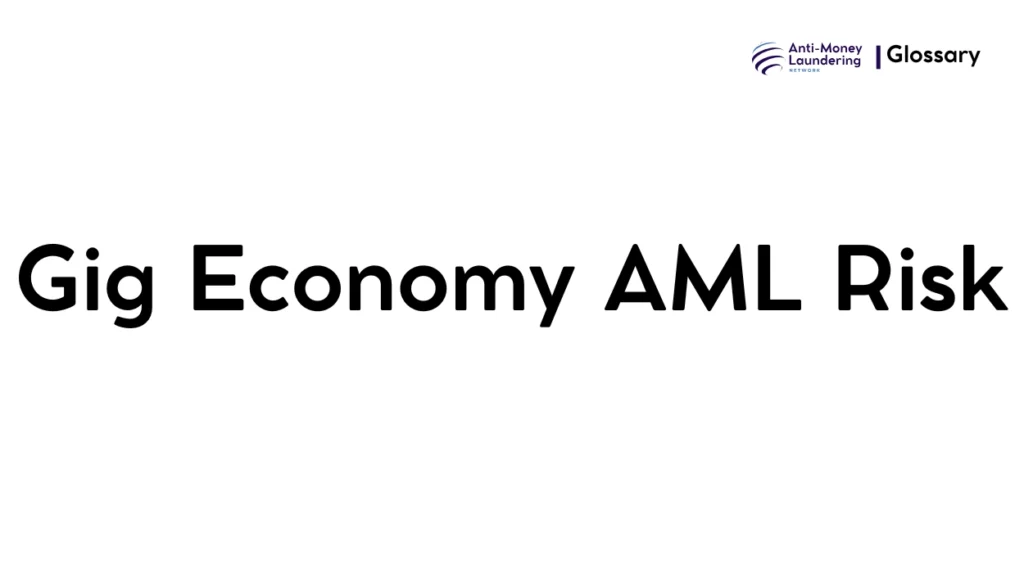Definition
Gig Economy AML Risk refers to the specific money laundering vulnerabilities and compliance challenges arising from the gig economy—where individuals work as independent contractors or freelancers rather than traditional employees. This risk encompasses the potential for illicit funds to be introduced, disguised, or transferred through gig work platforms and transactions due to factors like high worker turnover, decentralized payment methods, and difficulties in verifying identities and income sources.
Purpose and Regulatory Basis
Anti-Money Laundering (AML) frameworks identify gig economy risks to prevent criminals from exploiting these flexible work models to launder money or finance terrorism. The gig economy introduces unique complexities in tracing financial transactions, verifying participants, and assessing the legitimacy of earnings.
Globally, regulatory bodies including the Financial Action Task Force (FATF), the USA PATRIOT Act, and the European Union’s Anti-Money Laundering Directives (AMLD) emphasize applying traditional AML principles—such as Know Your Customer (KYC), Customer Due Diligence (CDD), and transaction monitoring—to evolving economic models, including gig platforms. These frameworks mandate that institutions adapt risk assessments and controls to address the growing role of gig work in the economy.
When and How it Applies
Gig Economy AML Risk applies whenever:
- Payments are made between gig workers and clients through digital platforms.
- Worker identities and backgrounds are difficult to verify or continuously monitor.
- Large or irregular payments trigger suspicion, such as rapid inflow and outflow of funds.
- Freelancers use multiple accounts or synthetic identities to receive payments.
Examples include ride-sharing services, freelance marketplaces, delivery platforms, and micro-task sites, where anonymous or semi-anonymous payments could conceal illicit proceeds or facilitate layering.
Types or Variants
Identity Fraud in Gig Economy
Criminals create fake profiles or use stolen identities to take gigs, extract payments illicitly, or funnel money through accounts tied to fraudulent workers.
Payment Fraud
Manipulation of payment processes, such as redirecting funds to unauthorized accounts or layering illicit funds across multiple gig transactions.
Background Check Evasion
Workers with criminal histories or those involved in illicit activities might bypass screening processes, increasing risk exposure.
Account Sharing and Platform Misuse
Legitimate accounts rented or shared with unauthorized users can be used to launder money or conduct fraudulent activities.
Procedures and Implementation
To manage these risks, financial institutions and gig platforms typically implement:
- Robust KYC and Identity Verification: Utilizing multi-factor authentication, biometric verification, and document validation to confirm gig workers’ real identities.
- Continuous Monitoring Systems: Real-time analytics track transactional patterns and user behavior to detect anomalies.
- Risk-Based Customer Due Diligence: Tailored checks based on worker profiles, transaction amounts, and geographic risk factors.
- Background Screening: Incorporating criminal records, sanctions lists, and watchlists into onboarding.
- Suspicious Activity Reporting (SAR): Triggered by unusual transaction patterns or identity inconsistencies.
- Education and Training: Teaching compliance staff to understand gig economy-specific risks and identify red flags.
Impact on Customers/Clients
From the customer perspective, rights and restrictions may include:
- Verification steps requiring submission of valid documentation before accessing gig platforms.
- Monitoring of financial activity which may flag and delay certain payments.
- Restrictions on account sharing or multiple account ownership to prevent fraud.
- Transparency about data collection and due diligence to safeguard privacy.
Duration, Review, and Resolution
AML controls related to gig economy risks involve:
- Ongoing Monitoring: Continuous assessment of transactions and worker profiles.
- Periodic Reviews: Regular risk reassessments of gig workers and platform activities.
- Incident Resolution: Investigations and potential account suspensions or regulatory reporting when suspicious activities are detected.
Reporting and Compliance Duties
Institutions must:
- Maintain documentation of identity verification and monitoring processes.
- Report suspicious transactions or activities timely to relevant authorities.
- Ensure compliance with national AML laws and international guidelines.
- Facilitate audits and regulatory inspections.
- Implement corrective actions in response to breaches or identified risks.
Penalties for non-compliance can include significant fines, reputational damage, and operational restrictions.
Related AML Terms
Gig Economy AML Risk is closely linked with:
- Know Your Customer (KYC): Identifying and verifying users.
- Customer Due Diligence (CDD): Assessing risk profiles.
- Suspicious Activity Reporting (SAR): Reporting red flags.
- Identity Fraud and Synthetic Identity: Criminal misuse of false identities.
- Transaction Monitoring: Tracking financial flows.
Challenges and Best Practices
Challenges
- Difficulty verifying transient or multiple identities.
- High volume and velocity of microtransactions.
- Balancing user experience with rigorous checks.
- Detection of synthetic identities.
- Regulatory divergence internationally.
Best Practices
- Leveraging AI-driven identity verification and fraud detection.
- Implementing layered authentication (biometrics, liveness tests).
- Continuous behavioral analytics and anomaly detection.
- Cooperation among platforms and regulators for information sharing.
- Regular staff training focused on emerging gig economy fraud trends.
Recent Developments
- Increasing use of AI and machine learning to detect complex fraud patterns.
- Adoption of biometric verification and continuous monitoring replacing one-time onboarding checks.
- Regulatory updates expanding AML scope to cover emerging gig platforms.
- Development of integrated cloud-based AML solutions for real-time risk assessment.
- Growing emphasis on balancing AML compliance with user privacy and seamless onboarding.
Gig Economy AML Risk represents a critical frontier in the evolving field of anti-money laundering compliance. The unique characteristics of gig work—flexible engagement, high transaction volume, and often decentralized control—create vulnerabilities that can be exploited for illicit financing. Compliance officers and financial institutions must employ robust identity verification, continuous monitoring, and risk-based procedures tailored to this sector. Staying ahead requires embracing technological advances and regulatory changes to effectively mitigate these risks and protect both platforms and their users.

